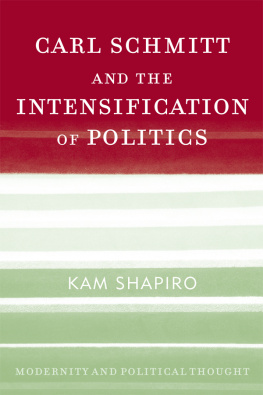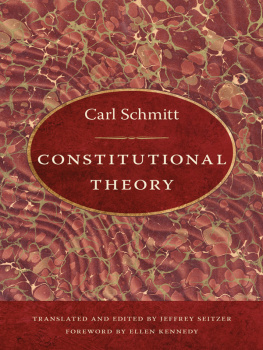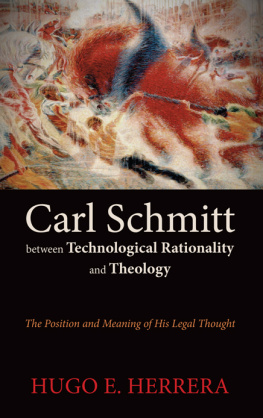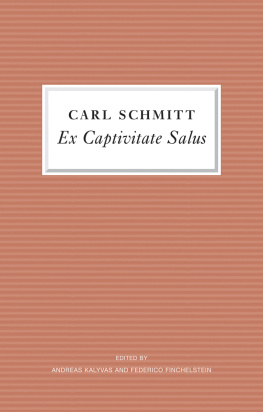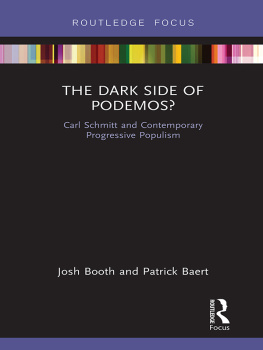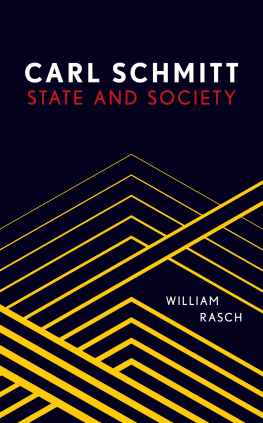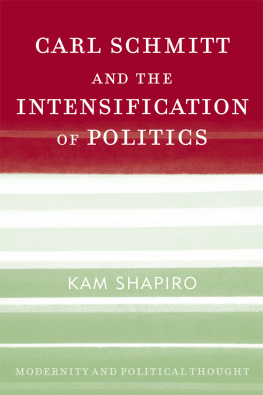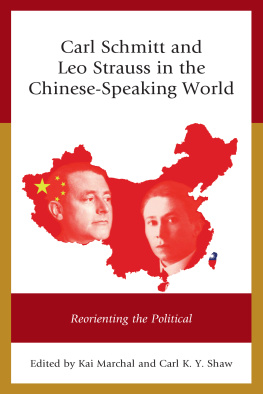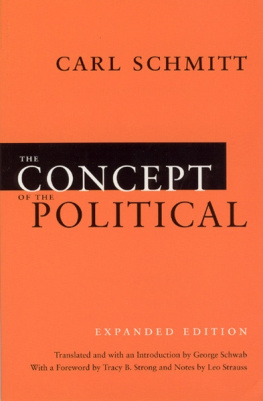chapter one
Schmitt at Large
Carl Schmitts reemergence as a political theorist of major interest has been described as symptomatic of a return to sobriety. In the decade following the events of 1989, giddy celebrations of a new world order composed of open markets and liberal constitutions were cut short by a proliferation of local and transnational conflicts. Starting with the ethnic cleansing and eventual partition of the former Yugoslaviaa premonition of the civil wars and genocides to followliberal democracies found themselves engaged in militant and polemical struggles with old enemies in new guises, and vice versa. More recently, in a global war declared against these enemies, they have mingled with religious and ethnic distinctions and compromised their own constitutions. The failure of the liberal state to contain the volatility of global markets and capture popular imaginations has inspired a familiar range of reactionary nationalism and messianic globalism. Schmitt, meanwhile, has remained topical. His critical analyses of the centrifugal potentials of liberal democracy, political theology, global politics, and asymmetrical warfare, as well as his formulations of authoritarian democracy, resonate with a variety of current concerns. Yet his writings and their implications have also been the subject of sharply divergent interpretations, partly in response to a changing political climate. In the 1990s, Schmitt provided a beleaguered Left with an acute and satisfyingly contemptuous diagnosis of an ostensibly depoliticized neoliberal order. More recently, his work has been seen as foreshadowing the repoliticization of that order in an authoritarian direction. For some, the move to Schmitt is symptomatic of threats posed to secular pluralism and the neutral state by demands for stronger forms of popular sovereignty and political identity (on both Left and Right). For a few, Schmitt inadvertently provides resources for a radical democratic pluralism.
Schmitt has thus become a diffractive surface for contemporary political debates, more frequently serving as an affectively charged symbol than an object of critical analysis. While his work has become widely available, it is more often cited than closely read. In this respect it is hardly unique, as textual interpretations are always in some respects polemical acts on the part of motivated parties. Nor would Schmitt himself likely have been surprised by the diversity of his appropriations. Indeed, as I will argue further, one could very well apply Schmitts analysis of polemical interpretations to current deployments of his own writings. However, his work is particularly susceptible to controversy, due to its peculiar combination of a highly charged historical situation, interdisciplinarity, and political ambivalence. Schmitt criticized liberal democracy from a variety of perspectives amidst its greatest crisis and failure, playing a complex role in the evolution and eventual collapse of the Weimar Republic before joining the Nazi Party in 1933. While consistently antiliberal, Schmitt demonstrated persistent uncertainties regarding the limits and possibilities of constitutional, religious, and popular sources of sovereign authority and power.
As Gopal Balakrishnan has suggested, part of Schmitts appeal is that the elusiveness of his position reflects that of our own. Many of the challenges Schmitt faced, while especially acute, remain familiar. His career illustrates the possibilities and dangers involved in a reconstruction of democratic sovereignty in an age of military, economic, and social dislocation. In addition to their political relevance, his writings combine historical and sociological analysis, metaphysical interpretation, and polemical rhetoric. They therefore comprise a fascinating intersection of discursive and political strategies. In the rest of this chapter, I examine this intersection, focusing on Schmitts efforts to distinguish a source of popular sovereignty in an age of global flows and social complexity. As I argue, a close analysis of these efforts reveals a complex set of tactics and dissimulations at work not only in Schmitts texts, but also in the practice of sovereign power and representation.
Schmitt composed his best-known works amidst the violent political and economic upheavals following the first wave of capitalist globalization and its collapse with the First World War. In these works, Schmitt described a general crisis of state sovereignty resulting from the combined challenges of corporate capital, international political organizations, bureaucratic administration, organized social groups, and the emergence of mass culture in the wake of new technologies of communication. Above all, Schmitt sought to prevent the sovereign state from being absorbed by these groups and forces. The state, for Schmitt, was properly a site of pouvoir constituant (constituent power), responsible for collective will-formation and its constitutional expression, though his understanding of the exact relationship between law and power varied over time. In his defense of the sovereign state, Schmitt struggled with the threats to political autonomy highlighted by Hegel, and especially Max Weber, with whom he had studied. On one hand, centralized legislation and decision-making were jeopardized by the plurality of bureaucratic functions and agencies required to manage bourgeois economies and the social order in which they were pervasively integrated (what Schmitt came to call the quantitative total state). On the other hand, liberal society was itself being organized into various social groups, particularly capital and labor associations that, in turn, were channeled by political parties. Just as flexible and rapid administrative reactions were necessitated by foreign and domestic pressures, along with rapid military, economic, and technological developments, the autonomy of the political administration (not to mention journalists and academics) was jeopardized by competing parties and unstable coalitions. Rather than integrating antagonized social groups, public policy and law were instrumentalized by them, or by professional politicians seeking their votes. As Schmitt described it, the depoliticization of government was met with the politicization of society.
Along with these general challenges, the parliamentary system of the Weimar Republic suffered a unique combination of domestic and international pressures. Not only was the Republic itself a new government, parliament had always been a weak source of national integration in Germany due to its history of estate-based representation. The Weimar Constitution did not distinguish political parties from economic associations, preventing them from serving as organs of popular will-formation. Moreover, popular faith in liberal tenets of representation and rational will-formation had been shattered by the collapse of the European state system, the devastating violence of World War I and the economic crises of its aftermath. Other factors included cultural conflicts aroused by the avant-garde culture of Weimar Berlin and the Republics association with a humiliating capitulation to foreign powers after military defeat. Liberal elites were ill prepared to manage the combination of these crises with the dynamics of mass politics. As Max Horkheimer described it, the republican government was characterized by fragmented bureaucratic offices and lacked charismatic leadership. Under these conditions, radical parties (Bolshevik or Fascist) were able not only to capture political offices, but even to mount direct challenges to the state outside legal channels. Finally, in the aftermath of Versailles, corporate capital and foreign powers imposed severe military and economic sanctions on the administration, forcing budgetary adjustments and jeopardizing its claims to autonomy.

